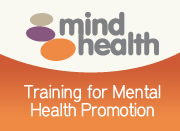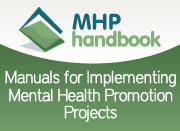Tools
- Utilities:
- Print this page
- Send this page
- Font size:
- Increase font size
- Decrease font size
Browse Database
Login, so as to add your own items.
-
Mental Health at Work: Developing the Business Case
29/05/2008
This paper discusses the importance to employers of mental health problems in the workforce. Drawing on UK and international evidence, it seeks to identify all the key effects of mental ill health and stress at work and, wherever possible, to quantify these in financial terms. It aims to demonstrate why mental health is important to all employers – as a business matter. The evidence indicates that better management of mental health at work makes good business sense, because of the substantial costs that are potentially avoidable through effective action. Settings: Workplace
MHP Steps: Preparation -
Dementia: Implementation Advice
29/05/2008
Provides practical advice to help the NHS (in the role of joint/lead commissioner) and social care organisations implement the NICE– SCIE guideline on dementia. Help implementers develop an action plan and should be used alongside the costing tools and audit criteria developed for this guideline. Aimed at joint health and social care planning and commissioning groups and at anyone leading the implementation of the guideline within their organisation, including primary care, acute and foundation trusts, mental health partnership trusts, private and voluntary residential and day care settings, older people’s social work teams working as part of a local authority and residential homes and day care settings run by local authorities. The independent and voluntary sectors may also find this information useful. Settings: Residence for Older People
MHP Steps: Implementation -
Combating Loneliness: A Friendship Enrichment Programme for Older Women
29/05/2008
Research indicates that friendship contributes to wellbeing in later life in various ways: through the provision of companionship in daily life, support during stressful transitions, sustainment of identity under changing circumstances and adaptation to old age. However not all older people have friends available who fulfil these different functions. In order to promote wellbeing and reduce loneliness, an educational programme on friendship enrichment for older women has been developed and implemented in the Netherlands. The friendship programme's main goal is empowerment; it helps women clarify their needs in friendship, analyse their current social network, set goals in friendship and develop strategies to achieve goals. Settings: Residence for Older People
MHP Steps: Implementation -
Beyond the Basics: A Sourcebook on Sexual and Reproductive Health Education
26/05/2008
A 400 page manual containing a wide range of topics: sexual health education topics including values, puberty and reproductive health, self esteem, sexual identity, relationships, communication and decision-making, contraception and safer sex and STIs and HIV. Designed for use in the classroom and in community agencies. Settings: Education
MHP Steps: Implementation -
Families & Schools Together (FAST)
26/05/2008
Families and Schools Together (FAST) is a multifamily group intervention aimed at reducing anxiety and aggression, while increasing social skills in children 5 to 14 years of age. Its goals are to (1) enhance family functioning; (2) prevent the target child from experiencing school failure; (3) prevent substance abuse by the child and other family members; and (4) reduce the stress that parents and children experience from daily life situations. Entire families (5 to 25) participate in program activities, designed to build respect for parents, bonds among family members, and bonds between family members and the school.
Settings: Education
MHP Steps: Implementation -
Geriatric Depression Scale (GDS)
26/05/2008
This is a screener questionnaire to classify older people on an geriatric depression scale (normal - mild - severe depression). This version is the long form and includes 30 short questions. Settings: Residence for Older People
MHP Steps: Implementation -
Identifying and Responding to Students in Difficulty. A Guide for Staff
26/05/2008
This guide is intended to help members of staff to (i) clarify their own role and the limits of their responsibility towards students in difficulty, (ii) work out when (and when not) to intervene, (iii) identify problems, (iv) decide what to do about them. It also aims to provide some strategies for dealing with more complex and difficult situations. Settings: Education
MHP Steps: Needs Analysis | Preparation -
Make it Happen. A Guide to Delivering Mental Health Promotion.
26/05/2008
A very general guide to mental health promotion in different settings (education, workplace, prisions etc.) which speaks from a policy level. Evaluation and evidence based results on mental health are discussed. Settings: Education
MHP Steps: Preparation -
Improving the Outcome for Older People Admitted to the General Hospital: Guidelines for the Development of Liaison Mental Health Services for Older People 'Who Cares Wins'
26/05/2008
This report draws attention to the neglected clinical problem of mental disorder affecting older people admitted to general hospitals and calls for the development of specialist liaison mental health services for older people. It takes account of the best level of evidence where it applies to older people. The present delivery of mental health services for older people in general hospitals is by the process of consultation. The superior method of multidisciplinary liaison is established for working age adults as a developed speciality. This approach should be established for older people and a failure to do so represents an ageist policy. Settings: Residence for Older People
MHP Steps: Implementation | Needs Analysis -
Promoting Independence Self Assessment Tool - The Long Marathon to Achieving Choise and Control for Older People
26/05/2008
This questionnaire has been developed to assist local authorities and their partners to identify areas for improvement in order to make the shift towards promotion of independence, prevention and early intervention. Settings: Residence for Older People
MHP Steps: Needs Analysis



